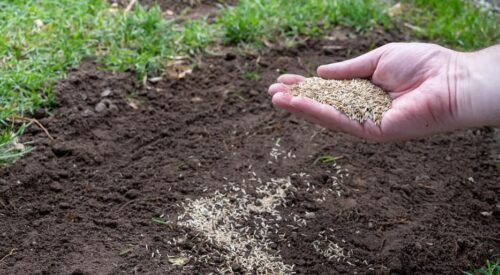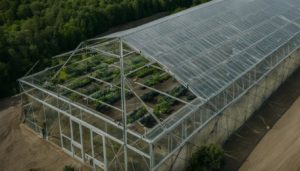Perhaps you have always wanted to set up your yard with a beautiful lawn, or you want to improve the quality of grass in your lawn with grass seed. This may raise the question, “Will grass seed grow if I just throw it down?”
Disclosure: This article may contain affiliate links – that means we may receive a commission if you make a purchase after clicking on these links. This is at no extra cost to you.
Generally, every seed in contact with some form of soil will grow, and grass seed is no exception. However, being intentional when attempting to plant grass seeds will largely influence the quality of growth you get and how long they take to grow.
To help you get the most out of your grass seed, keep reading to learn more about how scattering grass seed may not be the best option if you aim for a more luxurious growth.
How Long Does it Take for Grass Seed to Sprout?
Several factors influence the duration of growth for most grass seeds. On average, grass seeds usually take between seven to twenty-one days to sprout, assuming all required factors are in place.
Let’s take a look at each of these factors below.
The Type or Species of the Grass Seed
The rate of growth varies for most grass seeds and is primarily backed up by their species. As a result, whether you aim for a mowable lawn or a trimmable hedge will depend on the type of grass seed you plant.
The Quality and Viability of the Grass Seed
It is essential to seek out viable grass seeds before starting to grow your yard. Before spreading, ensure you obtain seeds that have been adequately preserved for planting.
Most agricultural research centers and government agencies provide great sources.
The Time of the Year When the Seed Is Planted
Every seed has specific times of the year when they thrive. Therefore, to achieve success with your planting grass seeds, you must leverage the times and seasons of the year.
For example, some seeds like Kentucky Bluegrass, Tall Fescue, Perennial Ryegrass, etc., flourish better in the cool seasons of late summer or the early periods of the fall.
Make Sure to Prepare the Soil for Planting Adequately.
Soil preparation is the reason why throwing grass seed down will most likely negatively impact the quality of growth you get. The reason is that the grass seed should be adequately rooted in the soil such that the sprouts do not get affected by heat or other changes in climate and weather conditions.
When the soil is appropriately tilled and loosened, it makes room for adequate aeration while enabling the seeds to be covered with enough soil to keep them firmly rooted, but not so much that they seem to be buried.
What Should I Do if My Grass Seed Is Not Growing?
So you have taken into perspective the factors that can influence the duration of growth, but you still have a bare or scanty lawn. It is time to consider other elusive reasons that could be retarding the growth of the grass seed.
Make the Correct Quantity of Water Available
Water availability is one elusive factor when dealing with grass seed. Yes, grass seeds need an adequate supply of water to grow.
It would be best if you were careful not to overwater or underwater your seeds after planting. While an undersupply of water will cause the seeds to dry out, an excessive water supply will drown the seeds, causing them to float rather than germinate.
Investigate Your Soil pH
Soil pH is another elusive factor that can result in no-growth even after carefully adhering to all seeding requirements. If your soil is too acidic or too alkaline, it can negatively impact the growth success of your grass seed.
However, if you are uncertain about the pH of your soil, you can always purchase a homeowner test kit. Another way to go about it is to send a sample of your soil for pH analysis.
Once you have ascertained the pH of your soil, you can proceed with obtaining the necessary fertilizers that will supply the necessary conditions to put your soil pH right on track and set you up for lawn or yard success with your grass seed.
Conclusion
Grass seed planting is an act of care for your environment as It requires a great deal of commitment and investment of time and resources.
In addition, because planting grass seed is an act of eco-friendliness, it deserves our maximum attention because we are always deliberate with our seeding. And that, in itself, is more rewarding in the long run as proper care for our environment.


